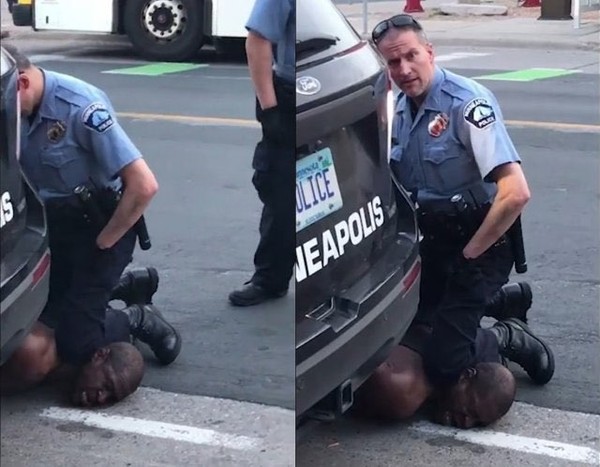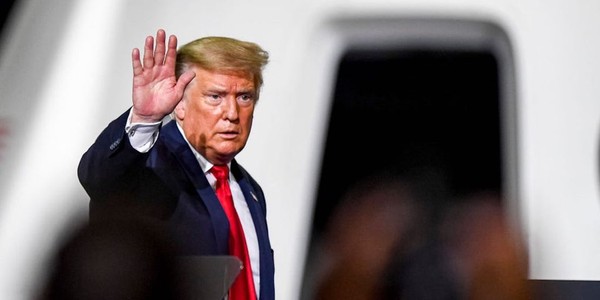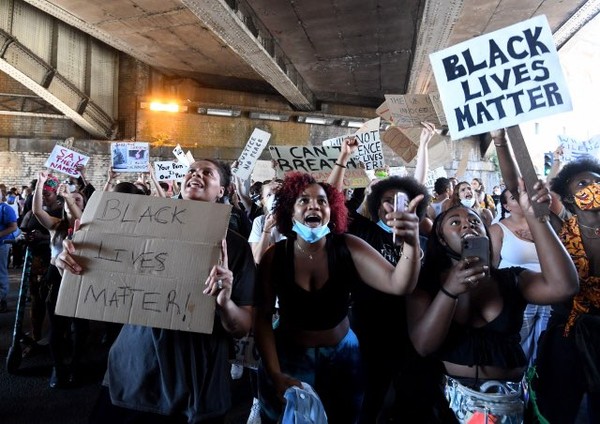
"Please don’t shoot me." "I can’t breathe." These are the words spoken by a black man who had his neck squashed by a police officer. George Floyd was arrested by the police for using fake banknotes and for refusing to get into a police car. The police officer pressed his knee upon the man's neck for 7 minutes and 46 seconds. While his neck was being squashed, he felt difficult to breathe, and he soon lost consciousness. The two police officers pressed his body, and one of them attempted to block a citizen from leaving with video coverage of the event. The man eventually died of suffocation from the action of the police officers.
#blacklivesmatter
On May 25, 2020, 46-year-old George Floyd died in Minneapolis, USA, due to excessive force by Police Officer Derek Chauvin. A video of him went viral on SNS. The day after the incident, citizens began protesting in the city of Minneapolis, where the incident took place. Starting at Minneapolis-St. Paul, protests and riots sprung up simultaneously and sporadically throughout the United States. Some citizens staged peaceful demonstrations such as the 'taking a knee' movement, but others, upset at the crackdown, held more violent protests. As a result, several shops including clothing stores, grocery stores, luxury goods stores, and Korean-American run shops, were looted and damaged by arson. The four police officers, perpetrators of the incident, were arrested on charges of murder after having been dismissed from the force. The police officers' arrest was followed by the Black lives matter movement, which lasted all throughout June, spreading to all nations around the world. In addition to large cities in the United States, there were also protests held in solidarity in Toronto, London, Paris, and Milan. Also, on various SNS platforms, individuals expressed their support with the hashtag #blacklivesmatter.
This is not the first Black Lives Matter movement in the United States. In 2012, a teenage black man, Trayvon Martin, was also killed by a police officer. Angered at the acquittal of police officer George Zimmerman, a social movement began in the US. Long before these incidents, the US has had a long history of discrimination against colored races, especially blacks. The Los Angeles Riots of 1992 were also motivated by discrimination against African-Americans. A black man, Rodney King, was beaten by a police officer. Cases of excessive force against black people by the police have continued. The 2014 Ferguson Unrest is another example. It occurred after an 18-year-old boy named Michael Brown was shot dead by a police officer. It was from this point that the BLM movement became more active. However, unlike the previous cases, the death of George Floyd sparked a movement that spread across the US. In response, Clifford Stott, a professor at Keele University, said, "This can be seen as a moment triggered by the nationwide spread because it symbolizes an experience that can be shared by far more people in the relationship between police and black society."1) The scars of racism continue to surface continuously in the United States.

Where are they headed?
The US government has responded to the George Floyd protests, and it also responded to protests in the past. However, the protests of 2020 have drawn great debate towards Trump's excessive response. During the Obama administration, deaths and protests connected with black discrimination also occurred, and former US president Obama said the deaths were caused by widespread racial disparities in Louisiana and Minnesota. He said that prejudices that existed within law enforcement agencies should be eradicated from the US. Obama listened to the voices of large-scale protesters and spoke out against racism.2) However, Trump's response toward the George Floyd protesters differed greatly from that of Obama's. Demonstrations against excessive police force and the murder of George Floyd began peacefully, but gradually they became marred by violence accompanied by looting and arson. Trump responded not with calls for restraint and peaceful protests, but with a curfew and calling protesters ultra-rightist and anti-government, even terrorists. He also said it was foolish to try to stop the protests but instead to crack down hard on the protesters by mobilizing troops to the state if the state governor did not stop the protests. On June 29, 500 US troops were deployed in Minnesota. Former US vice president Joe Biden said, "Trump has turned the country into a battlefield with long resentment and new fears." In other words, Biden criticized Trump's response and even brought about more violent protests across the US.
The George Floyd protests are evidence of chronic long-standing discrimination against blacks in the US. The protests took place in more than 50 states and were not restricted to large cities. Protesters were upset at the police's unreasonable use of public power against blacks. The issue is not new, but linked to the deep-rooted discrimination against blacks in the US. Professor Jennifer Eberhardt of Stanford University said, "Because of the prejudice against black people deeply rooted in American minds, they automatically think of violence and crime when they see black people." As she suggests, implicit prejudice against blacks is causing racial gaps in US society. Protesters demand a ban on discrimination against blacks and the guarantee of income, housing, health care, and education for blacks. Business Insider data showed that the average income of black people in the US in 2018 was $247 million, while that of white people was $427 million. The income of black people was only 58 percent that of white people. In addition, the average assets of white households was $102,000, but the average wealth of black households was $6,000; that is, blacks have only 6 percent that of white households. The income and property gap has caused black people to claim housing, health care, and education discrimination, and protesters are calling for support to narrow the gap. 72 percent of the deaths were black. In response, Dr. Cameron Webb, an African-American doctor, told the BBC that "The pandemic is amplifying the racial and economic imbalance in the United States." Statistics and Dr. Webb's quote show the background behind growing calls for change by protesters such as health care and education.

Korean point of view
With the BLM movement growing following the death of George Floyd, more and more people from around the world have started attention to and participating in the movement. In Korea, international students and local residents are also getting involved. At the beginning there was the thought that Korean did not have to actively participate in the BLM movement because discrimination against Asians was not as serious as it is against blacks. Choi Seok-hyung, a Colorado self-employed business person said, "I sympathize with the anger of the police and the discriminatory perception of blacks, but I cannot accept the looting disguised as racist protests. It's hard to understand the looting as an expression of anger against racism." 2 Many people cannot accept looting and arson, especially Korean shopkeepers, even if it is done under the name of protests against discrimination. Many Korean business owners feel repulsed by the idea. There is a coined phrase for Korean owners: "Roof Korean," made in 1992 during the Los Angeles riot when Korean residents had to guard their businesses and homes. Photos have surfaced of Koreans armed with guns on the rooftops of buildings. The photos read "The roof Koreans are back" on SNS. Koreans are defending against possible damage from the protests. These Korean residents and others do not actively support protests, even though they are aimed at stopping discrimination, in order to protect their livelihoods. Other Koreans, though, say the BLM movement, which is strong on SNS, and as such, they should lend a voice to the movement to eliminate racial discrimination because Asians are also the recipients of prejudice. Korean rapper Donutman, using the hashtag with #alllivesmatter, said, "Asians also discriminate against others. I feel this movement is very meaningful, but it’s not good to simply hop on the bandwagon and post black pictures." All racial discrimination should be eliminated and Asians should think carefully about the reason for putting BLM hashtags on their SNS posts. It should not be trendy but true support for the BLM movement.
There is also strong support for the protests because Koreans believe it will eliminate discrimination against all people of color. A rally was held in LA Korean Town to support black human rights, and another was held in Myeong-dong, though it was a silent march. Both were memorials to George Floyd. "The safest way to prevent events like the 1992 Los Angeles riots is to speak out with black people and join peaceful demonstrations," said Choi Kwang-chul, head of the Korean American Democracy Forum, a group that participated in the Korean town rally.3) Some Korean believe that they need solidarity because the protest are not solely aimed at elimination of discrimination against blacks, but all people of color. Shim Ji-hoon, who participated in the memorial march in Myeong-dong, said, "Honoring blacks does not mean we ignore reverse racial discrimination or pay respect to patriotic martyrs against Koreans or Asians. As members of the global community, we must create a world in which we all live together in harmony. This is something we cannot afford to overlook." Some consider, then, it a must to pay tribute to George Floyd, who died unjustly. It is not only about his race, but it is about discrimination against anyone. World-renowned Korean artists have also been involved in the BLM movement, using hashtags like "We are against racism. We are against violence." They donated $100,000 to the BLM. Hip-hop label 'Higher Music' also donated $21,000 and offered a clear declaration of support. The participation of many K-pop artists in the BLM movement shows how many Koreans perceive the protests as a voice against racial discrimination, not only the elimination of discrimination against blacks.

Our lives matter
"I have a dream," said Martin Luther King, more than 50 years ago. However, racism still remains a social challenge for people all over the world. George Floyd's death presented the world with the naked reality of discrimination against black people in the US. Peace and harmony arise from conflict. In this modern era when the whole world is said to be one, every human being should be respected for who they are.

1) BBC NEWS Korea, "George Floyd: Why Do Some Protests Turn Violent?", June 2, 2020
2) Lee Dasom, "The Korean Community In the US Is Divided over Protests", EDAILY, June 10, 2020
3) Jin Eunhee, “Koreans Join the US Peace Demonstrations… Korean Images Change Dramatically’”, Daily Good News, June 7, 2020
Jung Kim Hyeseung / Society Section Editor
smt_jhs@sookmyung.ac.kr
Na Cho Seongah / Reporter
smt_csa@sookmyung.ac.kr


